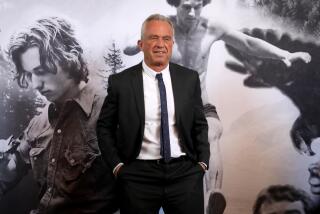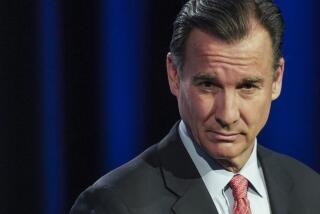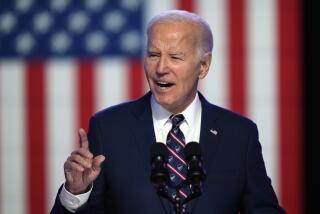Hillary Clinton Says She’ll Test N.Y.
- Share via
NEW YORK — Ending months of speculation, Hillary Rodham Clinton announced Friday that she is forming an exploratory committee to run for the U.S. Senate from New York. But even her closest allies said the first lady faces an uphill battle in a race that could have a dramatic political impact on congressional campaigns across the country next year.
In an appearance on ABC-TV’s “Good Morning America,” Hillary Clinton said she would unveil such a committee in July, adding: “And then I’ll spend some time--a lot of time--in New York listening to people, and I’m looking forward to that.”
Her comments triggered an avalanche of reaction from political pros and insiders, all of whom predicted that the first lady’s expected race against Rudolph W. Giuliani, New York City’s Republican mayor, would be the most exciting--and potentially nasty--campaign in the country, competing with the presidential election for attention. They cautioned that Hillary Clinton should brace herself for a close contest, since her once-huge lead over Giuliani in state polls--as much as 20 percentage points in January--has now shrunk to a dead heat.
“I can’t imagine a more epic or exciting confrontation,” said Democratic political consultant Hank Sheinkopf, who managed President Clinton’s 1992 campaign in New York state. “I believe she will be a fine candidate, but I also think she basically has a 50-50 shot of winning it.”
Hillary Clinton began considering the race earlier this year, after Sen. Daniel Patrick Moynihan announced that he was vacating the seat when his term expires. The historic prospect of a first lady campaigning for an elected position while still in the White House has triggered a torrent of commentary, yet neither she nor Giuliani has technically declared their candidacy.
By forming an exploratory committee, an action Giuliani took several months ago, Hillary Clinton can raise funds for a race and test the political waters without declaring her candidacy. On Thursday, Rep. Nita M. Lowey (D-N.Y.) dropped out of the Democratic Senate contest, clearing the way for Clinton.
Much has changed since the giddy days of January, when the first lady toyed with the idea of running and public opinion seemed to be hugely on her side. Joseph Mercurio, a veteran New York media consultant, said “the bloom is off the rose” for her in New York because “she finally has to say why she’s running in New York, where she’s never lived. . . . She has to say why she wants the job, something she really hasn’t done.”
Above all, Hillary Clinton is likely to face an opponent with a steely, combative style. Noting her formation of an exploratory committee, Giuliani said: “I think exploring New York is a good thing. Maybe she should explore New York a little. I should say, though, I have confidence that the next senator from New York will be someone from New York state.”
Under state law, candidates need only indicate an intention to live in New York to qualify for a Senate race. Although the carpetbagger issue could be potent, it didn’t stop outsiders like James Buckley and Robert F. Kennedy from winning Senate seats here. In recent weeks, the first lady has conducted a low-key search for housing in New York, chiefly in Westchester County, and the first couple have decided to spend their July vacation somewhere in the state.
This week, Giuliani sent out a three-page fund-raising letter to supporters, warning that Democrats would wage an “all-out war” to hold on to Moynihan’s seat. “Many people believe that the New York Senate seat would be a launching pad for her political ambitions,” said the mayor, who has in the past contemplated running for governor and clearly has ambitions of his own. His fund-raising letter foreshadows the tough campaign he would wage. Both sides are expected to spend $20 million apiece in the contest.
Besides the front-running Giuliani, other prominent New York Republicans considering the Senate race include Reps. Rick Lazio and Peter T. King. Former Sen. Alfonse M. D’Amato and New York Gov. George Pataki are considered longshot possibilities.
All have made an issue of Hillary Clinton’s frequent and increasingly political trips to New York, 10 so far this year, a portion of which have been charged to taxpayers. Her decision to form an exploratory committee may deflect some of that heat.
The first lady’s announcement came 48 hours after she made yet another campaign-like visit to New York City. Speaking at graduation ceremonies for the City University of New York, she blasted a Giuliani-backed plan for vouchers in the city’s public schools, saying, “We can never lift up our public schools, or the students they serve, by tearing them down.”
Her comments were more politically pointed than previous statements she has made about issues dividing her and Giuliani, and they came on the heels of meetings that she has been holding with experts who might help her Senate bid. In recent days, she has talked to a who’s who of political experts, ranging from presidential advisors James Carville and Mandy Grunwald to Hank Morris, the consultant who ran Democratic Sen. Charles E. Schumer’s winning campaign last year against incumbent D’Amato. Harold M. Ickes, a former White House aide, has been working behind the scenes as her campaign takes shape.
Besides education, Clinton and Giuliani can be expected to debate law enforcement issues, such as the New York Police Department’s record in cutting crime versus its negative image with minority citizens, and the best way to improve public health care. While the first lady holds a 32-percentage-point lead over Giuliani among city voters, according to a Quinnipiac College poll last month, she trails him in the suburbs and among upstate residents, who generally constitute 50% or more of the vote in a general election. As a result, both candidates are expected to compete fiercely for votes outside the city.
As political fever builds, observers say Clinton’s candidacy may also transform the political dynamic of the 2000 campaign nationwide. With control of the closely divided Congress at stake, Clinton may well become a focal point for mobilizing activists and voters of both parties: Democrats who adore her and Republicans who despise her.
“Her being a candidate is going to create an enormous amount of excitement nationally about Democratic efforts to win back” Congress, said Democratic pollster Geoff Garin. “For Democratic voters, it will create a lot more excitement about being a Democrat.”
Added Jim Jordan, political director of the Democratic Senatorial Campaign Committee: “She will be raising money that no one else can raise. That’s a benefit to all of us.”
But some independent analysts cautioned that Clinton’s campaign in high-cost New York could siphon fund-raising dollars from other Democratic candidates. Another question is whether she would give a liberal face to the Democratic effort nationally that may not be advantageous to party members running in more conservative states.
National Republican strategists made clear they intend to use Clinton’s liberal reputation to help drum up donations to the GOP nationwide.
Times staff writer Janet Hook in Washington contributed to this story.
More to Read
Get the L.A. Times Politics newsletter
Deeply reported insights into legislation, politics and policy from Sacramento, Washington and beyond. In your inbox twice per week.
You may occasionally receive promotional content from the Los Angeles Times.










